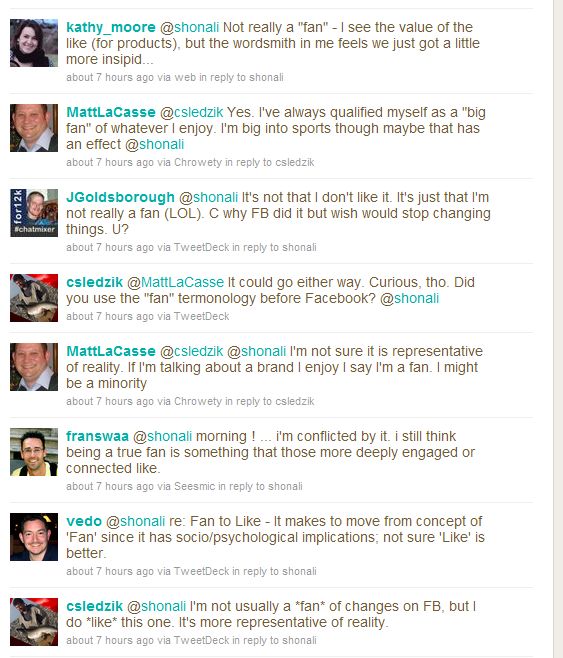 “Like” is the four-letter word that outdoes them all.
“Like” is the four-letter word that outdoes them all.
I’ve been trying to figure out why I reacted so strongly to Facebook’s announcement that their “like” button is the new green.
OK, they didn’t exactly say that, but that’s what it amounts to, doesn’t it?
From now on, you won’t be able to “fan” a page on Facebook, you’ll “like” it. (Hello, Mashable, didn’t you get the memo?) You won’t become the fan of a brand, you’ll “like” it.
Image: Alba Danés, Creative Commons
When you go to CNN.com, for example, you’ll be able to see what other people have “liked;” when you shop, you’ll be able to see what your “friends” “like.” And so on and so on, etcetera, etcetera, etcetera.
The best commentary I’ve found to date on this development is Robert Scoble’s. If you haven’t already, you should read it.
I get the pros for businesses and the cons for individuals. Heck, Google’s already taken over the world, why shouldn’t Facebook have its shot at it? So I’m not really going to bother with the whys and wheretofors of it. It’s here and it’s probably not going anywhere.
What sticks in my craw a bit is how ubiquitous the word “like” – and its implications thereof – has become.
Where did our passion go?
As a consumer, I don’t “like” Elvis. I LOVE Elvis. And Elvis Presley Enterprises benefits.
As an independent PR practitioner, I don’t “like” Tungle. I ♥ it big time. And Tungle benefits.
As a content-sharer, I don’t “like” Google Buzz, even though it forces me to use the word to signify appreciation for something someone’s shared. I hate it. And Google… well, Google doesn’t really care what I think.
Certainly, Facebook didn’t invent “like.” Stumbleupon‘s been doing that for a while, though at least they had the decency to add an exclamation point after, thereby giving it some pizazz.
But if all we’re going to do is get folks to “like” stuff, then we PR and marketing practitioners have our work cut out for us.
Because we need our audiences to do more than “like” us/our clients; we need them to be so motivated that they’ll actually DO something, whether it’s share, email, sign up, buy, donate, or take whatever action(s) it is we need them to take.
Apparently I’m not the only one who feels this way. Here’s what some of my Tweeps had to say:
To me, “like” is the four-letter word worse than many other four-letter words. Because it’s just… so… insipid, as Kathy Moore tweeted.
Seriously, with all the brainpower at its disposal, could Facebook not have come up with something better?
My friend Desi del Valle summed it up best in an email. She gave me permission to share this with you, so here it is:
What say you?




![[EVENT]: PR Hacks for Small Biz (online)](https://shonaliburke.com/wp-content/uploads/2021/06/FB-Ad-1200x800-01-01-01-Copy-500x383.jpeg)





Hi Shonali, it’s nice to see that my word choice (insipid) is resonating with you! Facebook’s preference for the “like” over “fan” terminology makes me feel like we are all poised at the edge of a slippery slope into mediocrity and ubiquity.
Fan and like have different connotations. A fan is more passionate, more involved, more committed. We are brand ambassadors when we are fans. Like is simply…less.
So without further ado, let me say I am a “fan” of your post.
“Insipid” was the word I needed to start (and finish) the post, Kathy, so thank you very much for giving me the missing piece of the puzzle. And hey, there, “fan.” ;-)
Thank you Shonali.
I agree that like is fairly nebulous. At the same time, I believe that most of the people who click the button, whatever the text actually says, are not fans, they’re probably expressing a milder sentiment, voting or subscribing. The raving fans and lovers are there but in small numbers.
Facebook has a grand plan which may very well enable them to dethrone Google.
On the new Facebook community pages, an essential part of the plan, like makes a lot of sense. (I explain on my blog.)
Larry Brauner
Thanks for stopping by, Larry. Perhaps it seems like semantics, but I still feel “like” is just so insipid. With all our advances in communication, sometimes it feels as if language is not progressing, but regressing.
I fully agree. Instead of loving, hating, tolerating or being frustrated by something, you can like it or not. Seems like Facebook has a really small dictionary.
My point exactly, Melanie. Thanks for stopping by!
[…] Why “Like” is a Four Letter Word […]
Social comments and analytics for this post…
This post was mentioned on Twitter by shonali: It’s off my chest. Why “like” is a 4-letter word h/t @franswaa @MattLaCasse @kathy_moore @JGoldsborough @csledzik @vedo http://ow.ly/1BYi7…
[…] This post was mentioned on Twitter by Shonali Burke and Kipp Lanham, Jose. Jose said: RT @shonali: It's off my chest. Why "like" is a 4-letter word h/t http://ow.ly/1BYi7 @franswaa @MattLaCasse @kath… http://twishort.com/aarhr […]